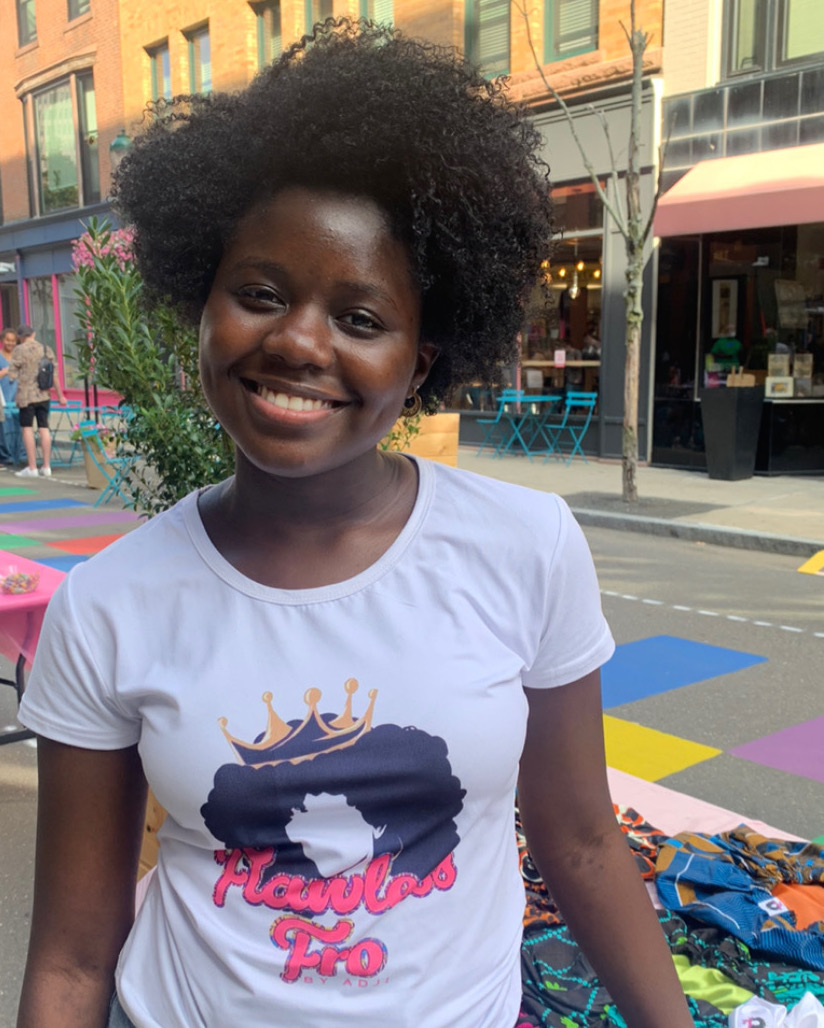
Black-owned businesses | Culture & Community | Education & Youth | Arts & Culture | West Haven | Hill Regional Career High School
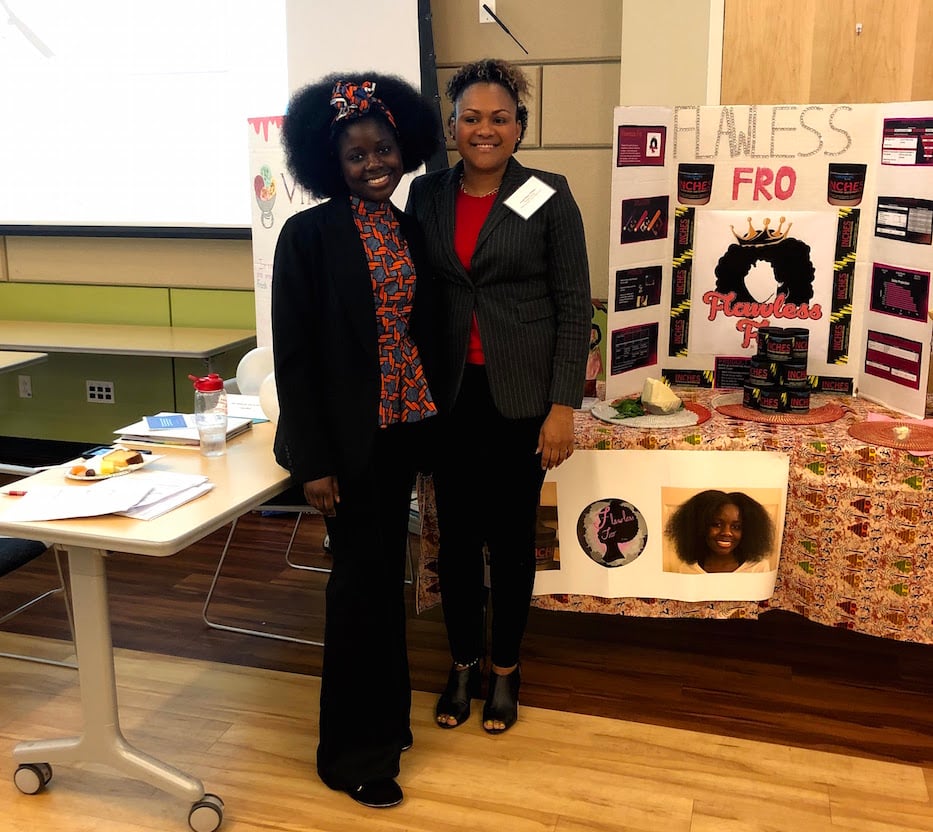
Senior Adji Cisse and Career teacher Kimala Bisasor Williams presenting Flawless Fro at a conference. Pre-pandemic file photo courtesy of Kimala Bisasor Williams.
On a recent school night, Adji Cisse stood over an electric mixer, straining essential oils through a mesh sieve. Hints of eucalyptus and lavender rose from the bowl. Then notes of coconut and jojoba. The mixture thickened and gleamed as the whisk whirred away. Beside her, a neat row of jars waited eagerly for the precious salve.
Cisse, a senior at Hill Regional Career High School, is the 17-year-old founder of Flawless Fro, a product line for Black women and girls embracing their natural hair. After dreaming up the brand in a finance class two years ago, she has formally launched a line with clients from New Haven and West Haven to Chicago to Senegal. The business officially turned two late last month.
“I wanted to give young Black girls like me the confidence to wear their natural hair and rock their fro,” she said. “I wanted to help erase the stigma that natural hair is ‘ghetto’ or messy or unkempt. And I wanted to gain the confidence myself to love my natural hair.”
The journey to Flawless Fro began four years ago, when Cisse was starting her freshman year at Career High School in New Haven’s Hill neighborhood. Born in New Haven and raised between Chicago, Senegal, New Haven, and West Haven, Cisse grew up straightening her hair using chemical relaxers every six to 12 months. As a kid, she said she often felt self conscious about her hair and skin, particularly in white social and educational spaces.
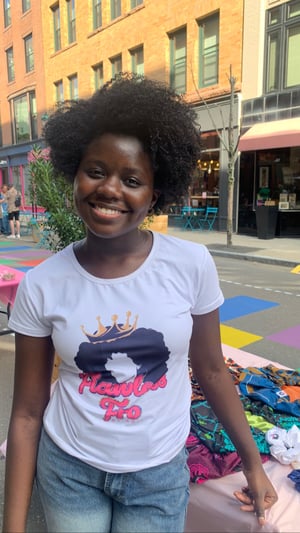
That changed when she was entering high school in 2016. During her freshman year, she began spotting photos on social media of Black women showing off their natural hair. While it still wasn’t the trend in her classroom or her home, she had an inkling that it could be. When she declared an interest in the school’s business and entrepreneurship track, she began to envision a product for girls who looked like her—by girls who looked like her.
“Seeing those Black girls wear their natural hair made me want to,” she said. “Seeing that was so cute, and so different than your typical straight hair or your braids. Seeing the trend start to form, seeing other people embrace their natural hair, made me want to embrace my natural hair.”
She was also anxious, she added. Cisse has tight, kinky curls that bounce when she laughs or tilts her head to say something. She’d heard that natural hair was hard to care for. After years of using relaxers, she didn’t know how the transition would go. But she wanted to try it.
In an entrepreneurship class her sophomore year, she drafted a business plan for Flawless Fro. Career instructor Kimala Bisasor Williams, who was her teacher at the time, recalled how hesitant she was when she got the assignment. Cisse was the only sophomore in the class, which is usually taken by juniors and seniors. She told Williams that she doubted herself.
“She believed that she couldn’t come up with a business,” she recalled in a recent phone call. “She was so young. But Adji, she is also so fearless and obedient, and she jumped in.”
Williams watched as Cisse devised a business plan and started thinking about her target audience and potential networks of distribution. Normally, Career students take a field trip to the wholesale district in New York City. After visiting it once, Cisse called Williams to learn more about the area. Williams realized that Cisse wasn’t asking because she thought it would help her grade. She was building a prototype.
While she was still in her sophomore year, Cisse tinkered with the business plan with shea butter she had around the house. She returned to the wholesale district with her parents for her 15th birthday, buying oils, shea butter, and custom-made ingredient labels. She started small, with just 50 jars of a salve meant to repair damaged hair. She called it “Inches,” shorthand for the inches of healthy hair that it would nurture. Her testers included friends, family members, and Williams herself.
"I kind of kept it low-key," Cisse said. "I was kind of shy about it. I was so young, and I didn't know what people would think."
She didn't keep a low profile for long. Friends gave her reviews and shout outs. Classmates started coming to her as "the girl who sells the hair stuff," she remembered. She reinvested her profits into expanding her line, working with family members in Senegal to buy silk scrunchies and brightly patterned silk-lined bonnets. She added her products to the shelves at Betty’s African Hair Braiding in the Hill and Oumi’s Haven Hair Braiding on Dixwell Avenue, both of which are run by her aunts.
“Starting my business gave me the confidence to wear my natural hair, so I wanted every Black girl just like me to have the confidence,” she said. “That insecureness has been instilled in us since we were young. We're used to perming it and straightening it. I feel like it's still not as accepted … natural hair discrimination is still very real and very present. So I wanted to be part of the solution.”
She was just getting started, she added. Her junior year, Cisse became the vice president of her school’s business organization and joined DECA (Distributive Education Clubs of America), a business and marketing club for high school students. She built out her line with a sustainable shampoo bar that she dubbed Sheapoo. She learned about California’s CROWN Act, a legislative measure to prevent discrimination against natural hair.
The CROWN Act stands for Create a Respectful and Open World for Natural Hair. Although similar legislation came to the Connecticut state legislature last year, it lost steam after COVID-19 unexpectedly halted the session in March.
Launching a small, Black-owned business has not been easy, Cisse added. In New Haven, only Career High School belongs to DECA; statewide and regional conferences tend to be very white spaces. Before COVID-19 moved schools online in March of last year, she became accustomed to being one of the only Black students at business conferences. Judges also rarely looked like her, she noted. Last year, she successfully pitched Flawless Fro at a statewide competition, only for the follow up in Nashville to be cancelled due to the pandemic.
“We are really underrepresented in that space," she said. "I feel like we're overlooked, just being Black in those predominantly white spaces. I really am passionate about having Black kids and inner-city kids and minorities represented at the top and given those opportunities. I feel like we have to fight for those opportunities and present ourselves 10 times harder to get a shot at it. It's harder for us to get those opportunities."
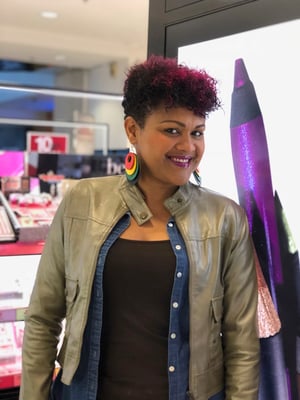
She has a network of Black women to support her. In her 17 years in the field, including four and a half Career, Williams (pictured at right, pre-Covid) said she has never seen a student with the same level of dedication and moxie. After watching Cisse grow out her business plan, Williams did “the big chop” herself and started her own transition to natural hair. She has remained a Flawless Fro tester and evangelist ever since.
She said she can’t imagine going back. After watching her own inches multiply (“I love it, because it’s minty and I love the feeling on my scalp,” she laughed), she started using the smooth butter salve and the shampoo bar for her daughter’s hair. She turned her mom onto it. She recommended it to the assistant principal.
“It is amazing for an African-American woman to be able to dream so young,” Williams said. “She needs to know that she can move mountains with it. She’s had her grassroots moment, and for many entrepreneurs, this is the moment that she needs that motivation. I continue to encourage her.”
From New Haven to Chicago, Flawless Fro has gained a devoted base of followers. As a friend of Cisse’s, Career senior Gabrielle Fisher started using Inches as a gesture of support as she began her own natural hair journey. She continued using it because it works for her. In the midst of a year turned upside down by COVID-19, online school, and college applications, she said that the product is a constant she can rely on.
“Despite Adji being my friend, I would still use the product because it works for my hair,” she said in a recent phone call. “To me, it works better and it works for my hair better than everything. Being natural—it’s a choice. You don’t have to go natural. But I love being natural. I really do love my hair.”
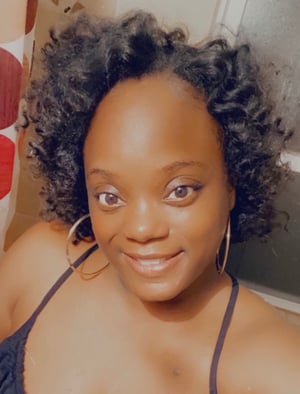 Lifelong Chicagoan Shanecka Boston (pictured at left) called it a lifeline to healthy hair. For at least a decade, Boston has been going to Cisse’s aunt for styling needs while also working as a server at O’Hare airport (she is currently among thousands of airport employees who have lost work due to COVID-19). She went natural for the first time in 2014.
Lifelong Chicagoan Shanecka Boston (pictured at left) called it a lifeline to healthy hair. For at least a decade, Boston has been going to Cisse’s aunt for styling needs while also working as a server at O’Hare airport (she is currently among thousands of airport employees who have lost work due to COVID-19). She went natural for the first time in 2014.
Two years later, she went into kidney failure. Her hair started coming out in clumps. Cisse’s aunt gave her a jar of Inches and told her to try it.
“My hair was paper thin,” she recalled. “When I washed it, it was coming out in patches. It was just really thin and looked terrible. It took maybe a month or so, but it looks totally different now. You can definitely see the difference. It thickened up and grew back.”
From her home in West Haven, Cisse is now building out her five-year plan while also navigating her final year of high school. At the beginning of her senior year, she became the president of her school’s business organization. In the midst of school, she’s holding down a part-time job as a shift manager at SolBol, a natural foods spot on the lip of the city’s Hill neighborhood.
At home, she’s piloting new products that she hopes to start selling in the first months of this year. When she’s not doing schoolwork or at SolBol, she tries to connect with her friends over the distance.
“I stretch my days as long as possible,” she said.
Last month, she was admitted to Howard University and Hampton University. She said she is waiting until she has all of her acceptances in to make a decision. What she does know, she said, is that she’s excited to study finance and marketing. In five years, she said she wants Flawless Fro to be a household name, as familiar in hair aisles at big-box stores and boutique storefront alike.
She looks up to brands like SheaMoisture, which Unilever acquired from Sundial Brands founders Mary and Richelieu Dennis in 2017 (Sundial now lives under that corporate umbrella, but has held on to a mission of wealth redistribution in Black communities). She said she wants to remain Black-owned, because she's seen so many Black-owned businesses acquired by L'Oréal, Unilever and other multinational companies that have white leadership at the top.
"I want to make sure the message is still there,” she said. “And I want to have given many young Black girls the confidence to wear their natural hair. I want to be a part of more CROWN Acts. There's a lot of things that Black women and Black men do in society that are critiqued for every little thing. I just want to be part of solving the overall problem. I want Flawless Fro to help society become more accepting."

